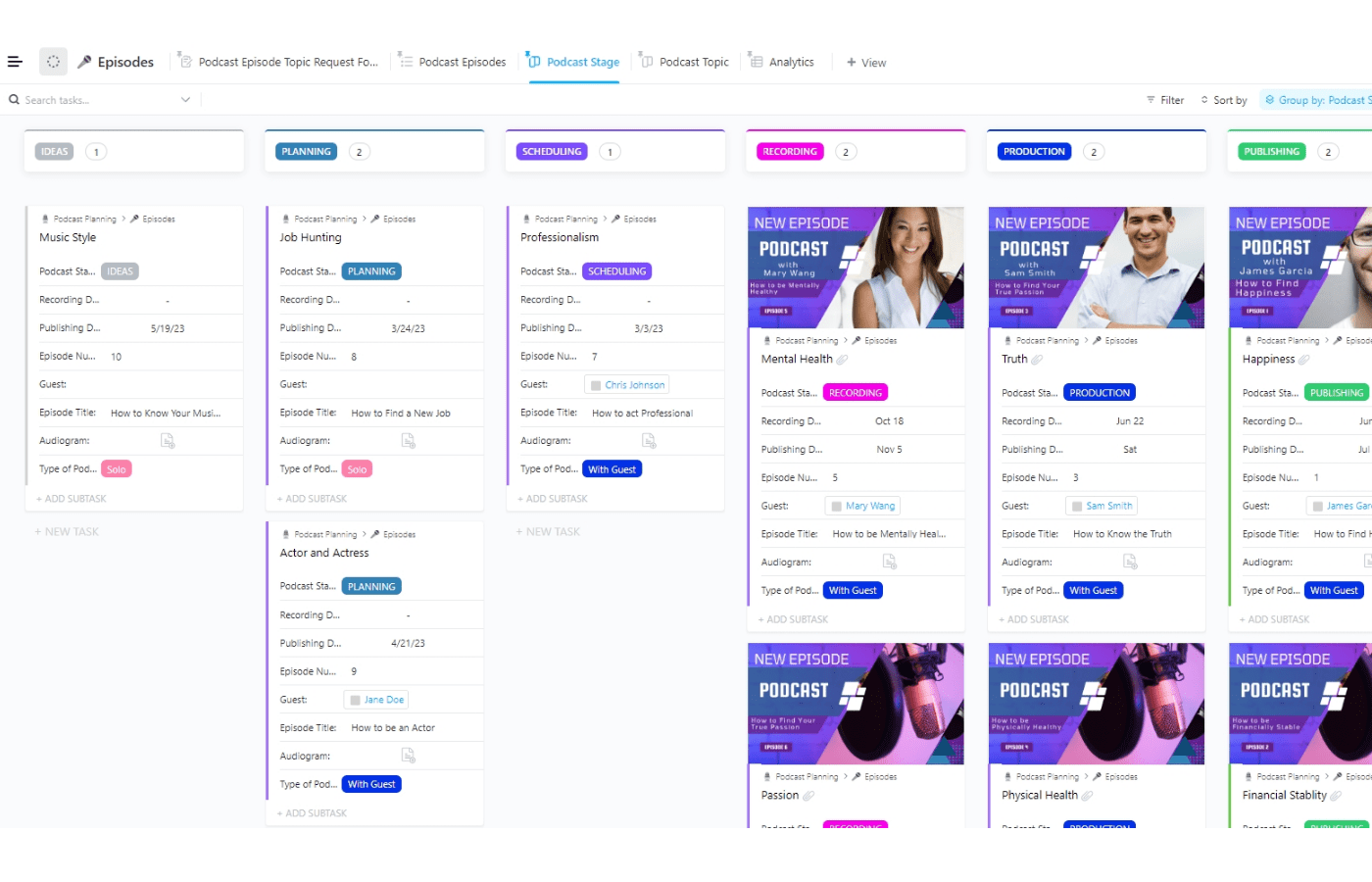Key takeaways
Do project managers make good money? The answer depends on a variety of factors—including what your definition of good is.
As of 2024, the average project manager salary in the United States is just under $90,000 per year. However, this is only the average. With some making under $58,000 per year and others making nearly $139,000 annually, there’s quite a bit of range to consider.
There are a lot of variables affecting project manager salary, including the following:
- Geographic location (for remote workers, the location of their employer)
- Prior experience in the field of project management
- Prior education or training in the field of project management
- The industry you’re currently in
How Much Do Project Managers Make?
The average PM salary tends to vary greatly between industries, companies, and geographic regions. However, overall experience in project management also plays a significant role in determining salary.
According to recent Payscale data on IT project manager salary, those with 20 years of project management experience in the IT industry can expect to make more than what a project manager with 10 years of experience earns.
Here’s how Payscale places the average annual salary of those in IT project management based on tenure:
- Less than one year: $66,000 annually
- One to four years: $78,000 annually
- Five to nine years: $96,000 annually
- 10 to 19 years: $108,000
- 20+ years: $117,000
Project managers in other industries tend to make less. Based on the research conducted by Payscale on general project manager salary, here’s how much PMs in other industries outside of IT earn based on tenure:
- Less than one year: $61,000 annually
- One to four years: $71,000 annually
- Five to nine years: $84,000 annually
- 10 to 19 years: $94,000 annually
- 20+ years: $97,000 annually
For those who tend to jump around from industry to industry or one company to another, the freelance project manager salary is comparable to the numbers listed above. Other roles in project management, such as the role of project coordinator, tend to pay slightly less. However, the industry isn’t the only factor to consider when determining remuneration.
Factors That Affect PM Salary
As mentioned, the average project management salary is affected by numerous factors. We’ve already covered how experience plays a major role when determining PM salary, but what about the other factors?
Location
Given the wide range in the average cost of living across the United States, it should come as no surprise that certain regions pay more than others. For example, a project management specialist working in the state of California is likely to make significantly more than one who is working in New Jersey. According to the U.S. Bureau of Labor Statistics, the top-paying metropolitan areas for project management specialists include:
- San Jose / Sunnyvale / Santa Clara, CA: $150,720 annual mean wage
- San Francisco / Oakland / Hayward, CA: $132,540 annual mean wage
- New York, NY / Newark, NJ: $128,810 annual mean wage
- Dothan, AL: $128,420 annual mean wage
- Casper, WY: 128,280 annual mean wage
- Seattle / Tacoma / Bellevue, WA: $125,390 annual mean wage
- Boulder, CO: $117,840 annual mean wage
Based on this data, it is clear that geographic location plays a huge role in determining how much project managers make. Generally speaking, PMs on the west coast of the US make more than their counterparts on the east coast or within the midwest. However, there are some exceptions, especially when it comes to major metropolitan areas.
Education
A project manager’s academic background also has a significant impact on their overall salary. In fact, many roles in project management require at least a bachelor’s degree in a related field. Some highly technical or niche project management roles might even require a specific degree, such as a bachelor’s or master’s in engineering or information technology.
According to Coursera, project management salaries tend to increase significantly along with the degree level.
- Bachelor’s degree from a four-year program: $99,138
- Master’s degree: $109,564
- Doctoral degree: $114,985
It’s important to note that these numbers represent the average salary for a project manager in the US. The exact salaries will also be subject to all of the other factors that normally affect pay, namely your location and industry.
Industry
Similar to location, the specific industry can also have a significant impact on project manager income. While a software project manager salary is approximately $95,904 or $46.11 per hour, PMs working in government only maintain an average salary of $69,237 or $33.29 per hour.
According to Zippia, the eight highest-paying industries for project managers include:
- Information technology: $95,904 annually / $46.11 per hour
- Finance: $92,065 annually / $44.26 per hour
- Construction: $91,283 annually / $43.89 per hour
- Manufacturing: $90,196 annually / $43.36 per hour
- Professional: $89,400 annually / $42.98 per hour
- Retail: $89,041 annually / $42.81 per hour
- Telecommunications: $81,951 annually / $39.40 per hour
- Government: $69,237 annually / $33.29 per hour
Those with knowledge of advanced concepts in IT, finance, construction, and manufacturing are often in high demand and, as such, get paid more.
Project Size
The overall project size or, more specifically, the total number of project team members, also affects project manager income. Since larger teams mean more people that need to be managed, it’s only natural that larger projects come with higher pay. In some cases, this could amount to an additional $25,000 per year when compared to PMs that oversee smaller teams and projects.
According to the Project Management Institute (PMI), median PM salaries based on overall team size within the US are:
- One to four team members: $106,888 annually
- Five to nine team members: $115,000 annually
- 10 to 14 team members: $121,533 annually
- 15 to 19 team members: $122,000 annually
- 20 or more team members: $130,000 annually
While these numbers are tempting and may convince you to seek the largest projects you can find, keep in mind that projects with teams consisting of dozens of members are far more complicated than smaller projects with one or two members. As such, these roles are generally reserved for established PMs who already have years of hands-on experience in the role.
Skills to Obtain
Most PMs leverage a variety of project management skills on a day-to-day basis. That said, the best PMs are usually highly versatile and eager to learn new skills and concepts. In some cases, certain industries or companies might even require specific skill sets. But there are also some skills that are useful regardless of the industry you’re in or the company you work for.
Communications
Project managers need to be able to communicate effectively. As a project manager, not only will you need to communicate with your team members to monitor productivity and address any issues that may arise, but you also need to maintain contact with key stakeholders. As such, you will often have to go back-and-forth between communicating with subordinates and communicating with executive-level figureheads.
Team Leadership
Great PMs need to be effective team leaders. Part of your responsibility is to prioritize and delegate tasks, share constructive feedback with your team members, and if necessary, provide disciplinary actions to those who aren’t doing their part. Because of the nature of the position, project managers are also expected to be approachable, empathetic, and understanding of any potential issues.
Time Management
Modern project managers need to be excellent at managing time as well. Between overseeing project timelines, monitoring the day-to-day work of team members, and making sure project deliverables are completed on a timely basis, diligence and organization are considered key skills that can take you a long way if you are pursuing a career in project management.
Conflict Resolution
Although it’s best to keep conflicts at a minimum, there are some cases where they’re inevitable. Whether you’re settling personal differences between team members, addressing issues with organizational leadership, or trying to convince stakeholders of the value of a new project, you need to be able to facilitate a solution that is beneficial for everyone involved. More importantly, you need to achieve this without having a negative effect on the project as a whole.
Risk Management
Even the most meticulously planned and highly organized projects carry some amount of risk. Some of the most common project risks include:
- Performance risks
- Technological risks
- Operational risks
- External risks
- Scope creep
As a PM, it’s essential that you know how to minimize these risks, and if they do occur, it’s even more important that you know how to address these issues in a timely manner. There are a lot of resources available that can help you learn more about risk management. Coursera’s project management course includes modules on risk assessment and management you can use to hone your skills.
Attention to Detail
PMs are highly detail-oriented individuals with stringent standards of quality. As a project manager, you need to keep track of the most important details and monitor every aspect of the work—from project timelines to completion of individual tasks. Losing track of key deadlines, for example, could result in extreme project delays that may be considered unacceptable in the eyes of key project stakeholders.
Certifications to Get
Apart from an academic degree, there are a plethora of project management certifications available to pursue. While some carry more weight than others, all of the accreditations listed below will look great on any PM’s resume. Moreover, they all have the potential for increased pay and benefits as part of your certified project manager salary.
Project Management Professional (PMP)
One of the most common certifications for mid- and senior-level project managers, the PMP designation is highly regarded by organizations around the world. There are strict requirements for taking the exam, including 36 months of experience for those with bachelor’s degrees or 60 months of experience for those with a high-school diploma or associate’s degree—which is why PMP is said to be not geared toward entry-level PMs. While the requirements are strict, the high salary that comes with having a PMP certificate is well worth the time and effort.
Agile Certified Practitioner (ACP)
The agile methodology includes a standardized set of frameworks, processes, and practices deemed ideal for managing large-scale projects. For those who already have a deep understanding of the agile methodology, the ACP is an incredibly valuable certification to obtain.
PMI Risk Management Professional (PMI-RMP)
Project managers need to be good at managing risks. Not only do you need to forecast risks with some degree of certainty, but you also need to address unexpected issues as they arise. If you have demonstrated the ability to manage project risks, getting the RMP certification is one of the best ways to validate your skills and increase your project manager income.
CompTIA Project+
Offered exclusively through CompTIA, the CompTIA Project+ certification is ideal for new and novice PMs. Whether you’re trying to get your foot in the door or you already have a couple years of project management experience under your belt, this accreditation will help you take your career to the next level.
FAQ
We’ve already gone into detail on the various factors affecting project manager salary, important skills to obtain, and different certifications to pursue. Here are other frequently asked questions you may find helpful.
Bottom Line
For those wondering how much project managers make, it’s important to remember that there is a wide range in current salaries. However, there are some steps you can take to increase the amount of value you bring to a company and, as a result, boost your project management salary. In some cases, this might be as simple as obtaining an advanced certification or degree in the field. Other times, you may be required to start with an entry-level role and climb your way up the ranks. Either way, the end result is always worth the time and effort.





